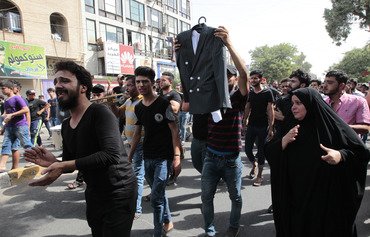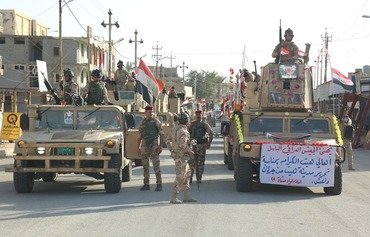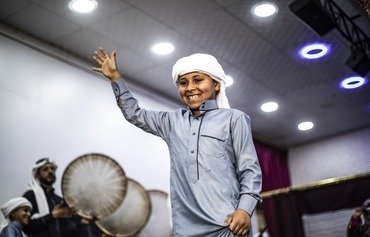Anbar towns newly liberated from the "Islamic State of Iraq and Syria" (ISIS) have seen a return of celebratory dances such as chobi, an Iraqi-style dabka, which the group had banned in areas under its control.
"ISIS banned everything in the areas it occupied, but they are now liberated, thanks to the efforts and sacrifices of the Iraqi forces," police chief Maj. Gen. Hadi Kassar Erzaij told Diyaruna.
"The security situation is stable in all the administrative districts of Anbar where ISIS gangs were expunged," he said.
It is now possible for wedding ceremonies and other celebrations to proceed as before, Erzaij said, with the traditional chobi dance a sign of this liberation.
The chobi is a popular bedouin dance traditionally performed at weddings and other festive occasions. Holding hands, the dancers move together in a long line, or circle, stomping their feet to the beat.
A variety of traditions
Anbar's tribes have a variety of traditions during their celebrations, Anbar provincial council member Mohammed Yasin told Diyaruna.
These include the chobi dance and a traditional wedding procession, zaffa, that involves "several vehicles carrying revelers as they roam the streets", he said.
Before ISIS occupied Anbar in 2014, the residents of the province would hold their celebrations at the al-Habbaniya tourism village, Yasin said. "But now that displaced families have taken shelter in its buildings, any celebration there has to be postponed."
The village will open its doors for celebrations again once the displaced families sheltering there have returned to their liberated areas, he added.
Meanwhile, he said, "the security forces are protecting celebratory events and gatherings against attacks from terrorist groups".
"The chobi dance is a fixture of tribal customs and traditions," Anbar tribal council head Sheikh Turki al-Ayed al-Shimmari told Diyaruna. "ISIS would threaten anyone who would perform this dance or sing and listen to music."
"The era and ideology of ISIS is gone," he said. "Now life is back to normal in Anbar, as people can celebrate without restrictions."
Music returns to Anbar
"Life was non-existent under ISIS control of Ramadi," said Zuhair al-Ani, 38, a native of the city. "There were killings and beheadings for no reason other than young people listening to songs or using their mobile phones."
Now the streets of Ramadi and other cities in the province are filled with people celebrating weddings, engagements, academic success and other special occasions, he said, adding that celebratory drums can be heard beating in the distance.
"Terrorist groups of every stripe do not want the Iraqi people to live," said Fallujah resident Maytham Abdul Jabbar al-Jumaili, 40. "ISIS tried to destroy everything beautiful."
The group destroyed recording studios and bombed shops where musical instruments could be purchased or rented, he said.
But signs of happiness can be seen again on the streets, al-Jumaili said. "We can now celebrate with others, whereas before we were not even allowed to have wedding celebrations in Fallujah."

![Iraqi men dance the traditional chobi dance at a recent wedding in Anbar. [Saif Ahmed/Diyaruna]](/cnmi_di/images/2017/05/31/8003-Iraq-Anbar-dance-600_384.jpg)






